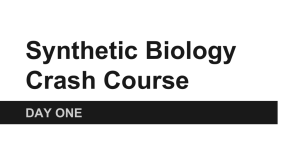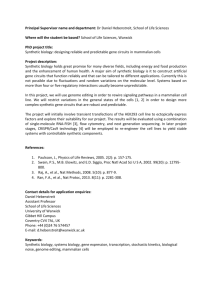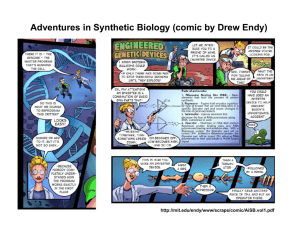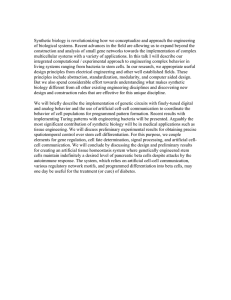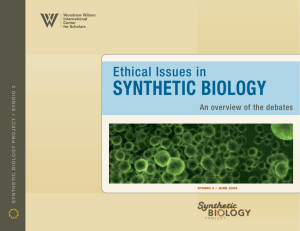Mas escription ter Course D No:
advertisement
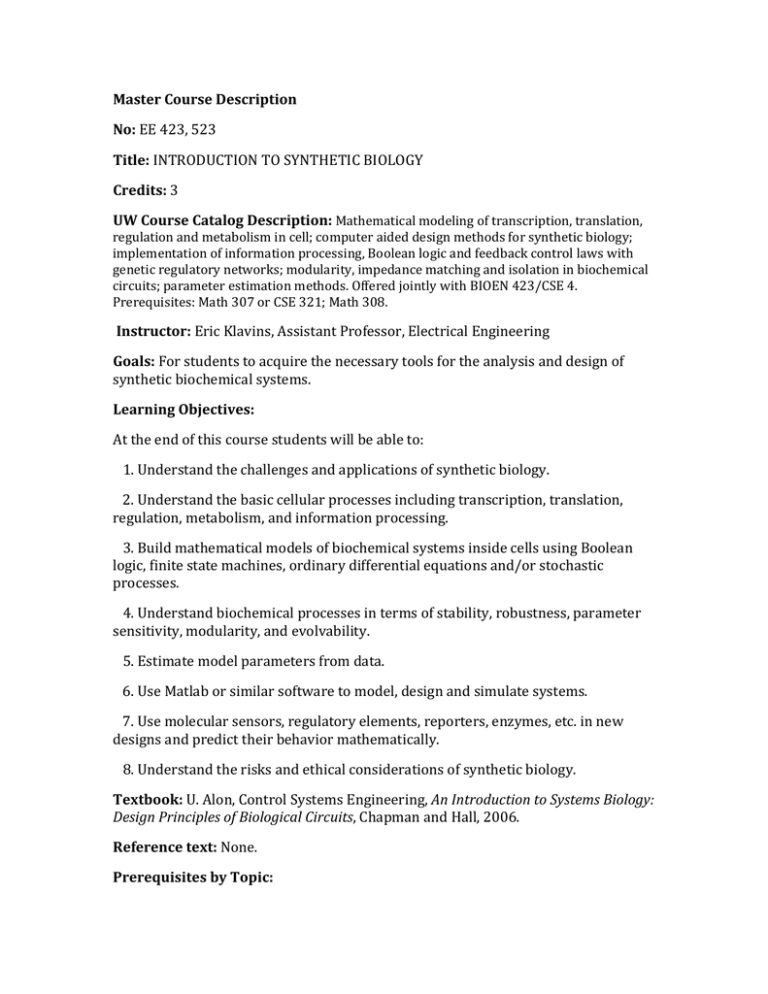
Master Course Description No: EE 423, 523 Title: INTRODUCTION TO SYNTHETIC BIOLOGY Credits: 3 UW Course Catalog Description: Mathematical modeling of transcription, translation, regulation and metabolism in cell; computer aided design methods for synthetic biology; implementation of information processing, Boolean logic and feedback control laws with genetic regulatory networks; modularity, impedance matching and isolation in biochemical circuits; parameter estimation methods. Offered jointly with BIOEN 423/CSE 4. Prerequisites: Math 307 or CSE 321; Math 308. Instructor: Eric Klavins, Assistant Professor, Electrical Engineering Goals: For students to acquire the necessary tools for the analysis and design of synthetic biochemical systems. Learning Objectives: At the end of this course students will be able to: 1. Understand the challenges and applications of synthetic biology. 2. Understand the basic cellular processes including transcription, translation, regulation, metabolism, and information processing. 3. Build mathematical models of biochemical systems inside cells using Boolean logic, finite state machines, ordinary differential equations and/or stochastic processes. 4. Understand biochemical processes in terms of stability, robustness, parameter sensitivity, modularity, and evolvability. 5. Estimate model parameters from data. 6. Use Matlab or similar software to model, design and simulate systems. 7. Use molecular sensors, regulatory elements, reporters, enzymes, etc. in new designs and predict their behavior mathematically. 8. Understand the risks and ethical considerations of synthetic biology. Textbook: U. Alon, Control Systems Engineering, An Introduction to Systems Biology: Design Principles of Biological Circuits, Chapman and Hall, 2006. Reference text: None. Prerequisites by Topic: 1. Differential equations 2. Linear Algebra 3. Familiarity with the use of Matlab or other mathematical software. NOTE: No biochemistry background is required. Topics: 1. The applications of synthetic biology 2. The risks, ethics and challenges of synthetic biology 3. Transcription, translation and regulation 4. Metabolism 5. Review of mathematical modeling 6. Mass action and enzyme kinetics 7. Stochastic chemical kinetics 8. Modeling software 9. In vitro synthetic biology 10. Composition, modularity and sensitivity 11. Robustness and sensitivity in biochemical systems 12. Parameter estimation and system identification 13. Review of recent literature in synthetic biology Course Structure: The class meets for three lectures a week (MWF). There is weekly homework due; Grading is based on homework, one midterm exam, and a final exam. The grading percentages and nature of the exams are left to the discretion of the instructor. Computer Resources: The course uses MATLAB for homework problems. The students complete an average of 3 hours of computer work per week. Outcome Coverage: (a) An ability to apply knowledge of mathematics, science, and engineering. Lectures and homework deal with the application of differential equations, linear algebra and Laplace transforms to control systems. (c) An ability to design a system, component or process to meet desired needs within realistic constraints such as economic, environmental, social, political, ethical, health and safety, manufacturability and sustainability. Students are required to apply the skills acquired in this course to design control systems to meet specific performance requirements. (e) An ability to identify, formulate and solve engineering problems. Some of the homework assignments require students to evaluate different design approaches to reach an acceptable design. (f) An understanding of professional and ethical responsibilities related to introducing new genetic material into the ecosystem. (h) The broad education necessary to understand the impact of engineering solutions in a global, economic, environmental and societal context. (j) Knowledge of contemporary issues in genetic engineering, gene therapy, biofuels and energy, medicine and disease. (k) An ability to use the techniques, skills, and modern engineering tools necessary for engineering practice. Students use Matlab to analyze and design systems. Prepared By: Eric Klavins Last revised: 4/17/2009 BIOE’s CEP rep stated that CEP really likes to see a statement which differentiates the graduate course from the undergraduate course. Otherwise, they won’t approve the course set. We therefore recommend, if you intend to use a shared syllabus with the course, that there be a section which specifically addresses any different expectations, learning objectives, or assignments for the graduate students.
